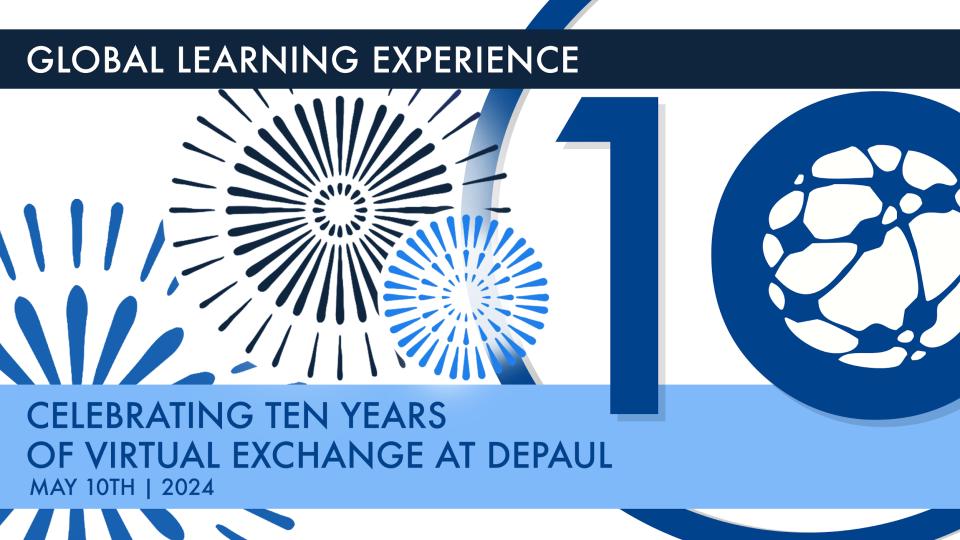
DePaul University’s award-winning Global Learning Experience (GLE) program is celebrating 10 years of innovative, international, collaborative projects.
Through the GLE program, DePaul has become a global institutional leader in the field of virtual exchange, and has offered hundreds of collaborative, international projects with partners from nations/territories all over the world, reaching thousands of students.
On May 10th, people from all over the world came together virtually to celebrate the milestone, featuring speeches from the founders of the initiative, the Center for Teaching and Learning and the Division of Global Engagement, from faculty who have created GLEs, as well as from students themselves. It was a wonderful discussion between people who have both contributed to the making of GLEs and those who have been thoughtful participants.
Dr. GianMario Besana, Associate Provost for Global Engagement and Online Learning, led the event highlighting GLE’s transformative impact of connecting students globally. Dr. Sharon Guan, Assistant Vice President of the Center for Teaching and Learning, emphasized GLE’s role in fostering intercultural understanding and experiential learning. Provost Dr. Salma Ghanem underscored the program’s growth from the first GLE in 2013, to the current status of GLE projects which has engaged 4,000 students across 40 countries. Dr. Ana Salomão, Assistant Provost for International Affairs from São Paulo State University (UNESP) and coordinator of Brazil’s Virtual Exchange program BraVE, highlighted DePaul’s crucial role: “Our partnership developed from faculty training to 14 successful virtual exchange projects involving hundreds of students.”
“The big impact for me has been bringing students in the disability community, which is the community I belong to, into globalizing our education,” remarked Kelly Tzoumis, reflecting on GLE’s inclusive reach and technological enablement. “This is an opportunity they wouldn’t necessarily have easily achieved without technology and our collaborative work in the classroom to bring students with travel barriers into GLE.”
Rob Steel, a faculty member deeply involved in GLE projects, emphasized the profound learning experiences facilitated by virtual exchanges. “You learn things that you cannot learn in the classroom,” Steel noted. “Respect cultural norms. Deadlines and time mean different things all over the world, and nobody’s right and nobody’s wrong.”
Lisa Dietlin, another faculty leader in GLE, highlighted the program’s capacity to foster innovative problem-solving across borders. “Jumping into GLE helped me realize just how powerful their minds are when you bring together people from different countries, perspectives, backgrounds, and educational tracks,” Lisa shared. “They solve problems you wouldn’t have imagined possible at the start of the project.”
The student panel highlighted the profound impact of international collaboration on personal and academic growth. Andre Cecilio from DePaul University, USA, emphasizing the collaborative nature of cinema, expressed excitement about engaging with diverse cultures in film production. Grace Fitzgerald from DePaul University, USA, underscored the development of deep friendships through dialogue with GLE partners, transcending mere academic partnerships. Nat Carvalho from FATEC, Brazil, shared the transformative experience of building an international network and making lifelong connections, emphasizing the invaluable personal growth facilitated by GLE. These reflections underscored GLE’s role in nurturing global citizenship and fostering cross-cultural understanding among students, marking it as a pivotal component of DePaul’s commitment to preparing students for a connected world.
Jes Klass, Creative Director at DePaul’s Center for Teaching and Learning highlighted the transformative impact of game-based learning in virtual exchange courses. “Games are not just recreational; they serve as powerful tools for engagement, fostering social ties and deepening instructional learning,” Jes emphasized. The session underscored how integrating play into education can bridge cultural differences and enhance student retention through interactive and inclusive learning environments.
As closing remarks, Dr. Besana expressed profound gratitude to the entire GLE ecosystem and highlighted the Center for Teaching and Learning (CTL) as a global model for embracing GLE’s pedagogical approach. He acknowledged Emily Kraus for her instrumental role in organizing the event and recognized Rositsa (Rosi) León’s, director of the GLE program, pivotal contributions in fostering global connections through GLE over the past decade.
Reflecting on recent challenges of inclusion and diversity, Dr. Besana underscored GLE’s role in creating inclusive spaces where diverse perspectives are honored, echoing sentiments from John Powell and Stephen Menendian’s article on “The Problem of Othering: Towards Inclusiveness and Belonging” (Powell and Menendian, Othering and Belonging, 2016). Looking ahead, Dr. Besana outlined ambitions to integrate AI in GLE to overcome language barriers while emphasizing the critical need for equity and inclusion in AI development.
The event concluded with a renewed commitment to expanding GLE’s impact and transforming student and faculty experiences globally, marking the beginning of an exciting new chapter for virtual exchange at DePaul University.